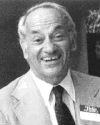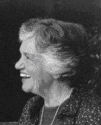Jack and Jeanne Block

 Jack Block was born in Brooklyn in 1924 to immigrant parents. His father died when he was very young, and so he was raised by his single mother. He enrolled in New York City public schools, and was a three letterman at Brooklyn College. Though initially interested in the study of medicine, he entered the Stanford Psychology graduate program in 1947.
Jack Block was born in Brooklyn in 1924 to immigrant parents. His father died when he was very young, and so he was raised by his single mother. He enrolled in New York City public schools, and was a three letterman at Brooklyn College. Though initially interested in the study of medicine, he entered the Stanford Psychology graduate program in 1947.
Jeanne Humphrey Block was born in 1923 in Tulsa, Oklahoma but grew up in Portland. Oregon. She attended Oregon State University for a year before enlisting in the US Coast Guard, serving during World War II. After the war, she went to Reed College and graduated in 1947. Jeanne then entered graduate school at Stanford University where Maud Merrill James became an important mentor.
Jack and Jeanne met at Stanford, took courses together, and embarked then on collaborative efforts leading to their dissertations where they formulated notions of ego control and ego resiliency, reflecting a Lewinian take on psychodynamic theory. They were married in 1950. Jack began working at the Langley Porter Clinic, and after two years moved on to the Institute of Personality Assessment and Research at UC Berkeley, initiating work on the development of a Q-sort instrument for the assessment of personality. After receiving her degree Jeanne held a variety of research positions in San Francisco and the surrounding Bay area, examining social and psychological factors predictive of childhood asthma. Over the course of the 1950s, Jeanne and Jack added four children to their family.
In 1963, the family spent a year in Norway; Jack, on sabbatical and Jeanne on an NIMH Fellowship where the Child Rearing Practices Report (a measure of parental socialization attitudes) was developed in the context of a cross-national study of socialization practices.
The Block’s returned to Berkeley in time to witness the birth of the Free Speech Movement there, and Jeanne became involved in the study of the moral beliefs and values of student activists. Jack published his influential The Challenge of Response Sets (1965), a work that reinforced substantive rather than stylistic interpretations of self-report personality inventories.
In 1968 Jeanne received a NIMH Research Scientist Development Award, became situated as a Research Psychologist at the Institute of Human Development at UC Berkeley while Jack became involved in analyses of an existing longitudinal research project at Berkeley, and the resulting Lives through Time (1971) establishing a role for person-centered approaches in the study of personality development.
Together, Jack and Jeanne initiated a longitudinal study of personality development. This "Block and Block" Project provided material for research on a variety of topics, including parenting effects, delay of gratification, and various cognitive styles. Across these diverse topics, Jeanne never lost sight of the role of gender and sex role, and this became the final and most influential of her interests. Tragically, in 1981 Jeanne was diagnosed with cancer, and died later that year. Her book, Sex Role Identity and Ego Development was posthumously published in 1984.
Jack continued the longitudinal study and participated in various in research controversies—his resistance to a model of personality consisting of five broad, factor analytically derived traits being perhaps the most notable. Jack died in 2010, with his final critique in press.
Tributes
- For a long time, Jack was a lonely swimmer against the mainstream of variable-centered psychology. His books on the Q-sort method and on the first person-centered long-term study of personality ("Lives through Time") as well as the 1980 chapter on ego-control and ego-resiliency by Jeanne and Jack Block laid the foundation for today's person-centered personality research. When my colleagues and I at the Max Planck Institute for Psychological Research in Munich were discussing which broad measure of preschool child personality we should choose for our long-term study of personality development, we chose the California Child Q-set developed by Jeanne and Jack. It was a good choice because the CCQ patterns proved to be predictive of personality up to 25 years later.
I was happy to be invited two times to Jack's house with that fabulous view to the Golden Gate Bridge, and was impressed by his energy even when he could hardly walk any more after dozens of hip operations – a model example for high resiliency. He continued to be deeply and broadly interested in national and international politics, personality science, and its applications until his death.
-Jens Asendorpf - When I was an Assistant Professor, I received a grant to study the effects of child maltreatment on various developmental domains. I was interested in Jack and Jeanne's work on ego resiliency and ego control and wanted to include an ER/EC battery in my study. I wrote to Jack and Jeanne and asked them if they would help me choose an appropriate battery of ER/EC for studying maltreated children. They invited me to Berkeley where I spent a week at their home working with them on this project. Jeanne and Jack were always supportive of my career. Throughout my career I have utilized ER/EC measures in my research with atypically developing children. I owe the Blocks a great debt for helping me achieve my goals.
-Dante Cicchetti - Jack was my Professor and colleague at the Institute of Personality Assessment and Research when I was an undergraduate at Berkeley. Subsequently, both he and Jeanne discussed research plans with me. Importantly, Jack contributed the age 23 TAT stories from his longitudinal sample for my research, which formed the basis for a number of my papers on defense mechanisms. He also shared much of the longitudinal data from that study with me, again contributing to research papers. We always has a warm collegial relationship. He had a strong personality and is very much missed.
-Phoebe Cramer - A central trait of Jack Block was a deep respect for science and an idealized view of what it should be. He reacted powerfully and sometimes angrily when he saw those ideals as being violated.
He was also powerfully loyal to friends – certainly to me; he bolstered my life and my career in many ways. He also really liked my wife, Patti, who joined us for several of the memorable dinners we shared over the years. Those dinners went back to the ones he co-hosted with Jeanne at their beautiful home in the Berkeley hills – where on many nights they presided over a sort of intellectual salon where the wine flowed generously and everyone became brilliant and full of great ideas – which we did not necessarily remember too clearly the next morning.
Thinking back, I’m struck by how many of my interactions with Jack had a memorable meal at the center – at his home or in one of the great restaurants in the Bay Area that he enjoyed. It was all part of enjoying life, and mixing together many kinds of pleasure – food, friendship, and intellectual exchange.
-David Funder - Both Jack and Jeanne Block were important mentors to me, each with such a different method. My learning style was always well-served by argument with a better informed opponent, a teaching style that naturally fit Jack; Jeanne instructed with the Socratic method, seemingly never running out of questions that pushed me to explore issues well outside my comfort zone. Though both were intensely interested in personality development, they also maintained unique interests, Jeanne in the psychology of sex and gender, Jack in quantitative methods. Separately, they were each accomplished mentors; but until her death, Jack and Jeanne were a duo beyond compare. Jack was the instructor-of-record in a number of graduate seminars (invariably held at the Block home in the evening) where for the first 90 minutes he would lead a half-dozen or so students through detailed and close readings that had been assigned. Then there was coffee and perhaps some dessert, and Jeanne would join us. The tenor of our discussion then changed, no longer staying close to the context of the assigned readings, but using them as a springboard to see a bigger picture and to ask larger questions. Watching how Jeanne and Jack interacted in these sessions was a marvel. Talking shop was, it seemed, was just another way for them to dance.
-Daniel Ozer - As developmental psychologists, I think that Jeanne was especially fascinated by social environments and Jack by individual differences. Their collaboration was an empirical tour dwe force. And they were fabulous dancers. What an awesome sight, jack and Jeanne swirling around their slate living room, wrapped in each other’s arms.
-Avril Thorne

